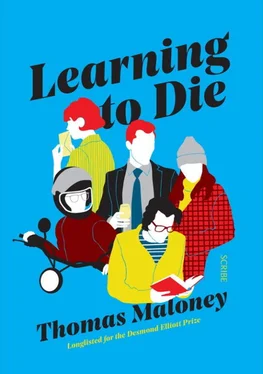Anyway, impelled by a divine mystery, the Box, a.k.a the MRI, Mike’s trading system, is raging back from last week’s wobble. He raises his coffee to his lips, eyes still fixed on the copper chart. The white line jolts down to a new low, and he glances across at his live profit-and-loss dashboard. Where last week it was covered in red, now he sees black numbers multiplying. Someone has hit their stops and is dumping copper, and nobody’s buying: it’s free money.
His desk has a window on one side, looking into a vertiginous atrium. A translucent film has been applied to the lower half of the glass to frustrate any prying eyes from two floors below, where another large hedge fund is working its proprietary magic. On Mike’s other side sits Mij, a developer working on electronic trade execution. This is in some ways an old-fashioned shop, where many of the traders still murmur or snap into their double-handset phones to trade — Mij is on the team tasked with dragging it into the electronic age. Since April, Mij, softly spoken, shrewd, somehow always in the know, has been Mike’s closest confidant. Mij’s name suits him well, in the manner of Little John’s — he’s built like a fridge — but his other colleagues, apparently lacking a sense of irony, call him that — Fridge — instead. The photograph of him and his pouting wife, for whom Mike feels that troubling sense of recognition as well as covetous attraction, stands inches from Mike’s mouse hand.
It was in April that Mike’s former boss, Crispin, ferocious nerd and architect of the Box, stormed out of the office, never to return. Mike later learned that Crispin’s boss, one of the big-shots, a tall, stooped, reptilian man with heavy-lidded eyes, had been heard saying to Crispin, with his office door wide open, ‘What was it David Ricardo said? Let your profits run and cut your losses. I think we both know which you are.’ Crispin had replied, ‘And we both know what you are, too,’ and that was that. Once you’re out, you’re out of the building.
But Mike and the Box remained. It wasn’t actually losing money, just not making much, and as well as personality clashes there had been a few unfortunate breaches of trading mandates and risk limits. Crispin, who had designed a rules-based trading system of devilish complexity, didn’t much like obeying rules himself.
The lizard summoned Mike to his office the same afternoon. ‘Can you operate it?’ he snapped. His eyes have a habit of wandering up and down, and Mike always thinks his flies must be undone, but they never are. ‘Yes,’ he said, feeling flattered. ‘ He’ll ask if you can operate it ,’ Crispin wrote in a text, which Mike read three minutes later. ‘ He’ll flatter you, say you’re promoted and then keep all the profits. You must DEMAND a trading contract in your name with the same $$$, and threaten to resign if you don’t get it. If he calls your bluff I’ll look after you. If he doesn’t, good luck. Crispin. ’
That, a few months of good performance, a decision to spin off the strategy as a new product, and Mike’s unexpected gift of the gab is how he’s ascended rapidly from the position of assistant trader to that of Rocket Jesus. The big money is coming in next week. Since Mike’s bonus — his first as a trader in his own right — will be based on his strategy’s raw dollars of profit, the last month of the year will be decisive.
Mike’s bank of screens is designed to dominate the real-estate of his visual field. He pushes his chair back a few inches and looks around at the office, the white-and-glass-walled cultural desert quietly humming with transactions that has gradually become his natural habitat.
To be fair, love is here, remotely. ‘The wife’ and ‘the kids’ are common topics for vapid banter, alongside sport and financial markets, but a different tone, hushed, charged, is produced for the telephone when ‘HOME’ flashes up on the screen. Love and its expensive offshoots are, after all, why most of the mere mortals — the underclass of facilitators of which Mike was until recently a member — are here (the megastars, seated a few desks away in the centre of the trading floor, toil for other, stranger masters).
And death is here, of course — the security guards, ex-Gurkhas with kukris, it is said, in their suit pockets, cannot keep him out. He poisons the icing on birthday doughnuts — one year closer — and drapes his mocking pall over the partners’ private gym, the only defence money can buy.
As for beauty, well, there are those silly token plants that look fake — their leaves glossy as vinyl — but are in fact real, and alive, and furtively watered.
James F. Saunders needs to expedite Project Q. He has written five thousand words and hit a wall: introduced his themes but not explored them — produced an unresolved short story, not a great novel.
There is no credit on his phone, so he calls Brenda from the payphone in the Bay Hotel. On answer press A . The coin clatters down.
‘Hi.’
‘Hello Brenda — it’s James.’ Silence. The seconds are ticking on the display.
‘Oh. Hi.’
‘How’s the chainsaw?’ More seconds.
‘Fine. Noisy bugger. How’s the typewriter, or whatever you have?’
‘Pretty quiet, actually.’
‘Writer’s block?’ She’s picked up a sporadic Highland twang, and it sounds like ‘bollock’. That’s his affliction: he’s suffering from writer’s bollock.
‘I’d like to see you.’ More seconds of silence.
‘I don’t know.’ James holds his nerve, says nothing. ‘I’ll be in Edinburgh this weekend,’ she says at last, the tone reluctant. ‘Staying with a friend. We could meet.’
‘It’s a date.’
‘It’s not a date.’
He’s elated. It was so easy. Getting to Edinburgh will be expensive, but not nearly as expensive as getting to NH 30253 00930.
‘I’ll wear my lucky pants anyway,’ he says.
‘…whoever calls to his mind… the great image of our mother nature… whoever sees himself in it, and not only himself but a whole kingdom, like a dot made by a very fine pencil; he alone estimates things according to their true proportions.’
Montaigne
Let’s talk about electrons. Wait, don’t skip this bit! Not because Dan’s dizzy little flock might take offence, but because there is magic here. Electrons, as most of us vaguely know and little care, govern chemistry and bind atoms into molecules, and so explain why everything around us — including this page, the air in your lungs and the front tyre of Dan’s motorbike — looks, feels and works the way it does. Most of us could also guess that electrons are what electricity is made of: when you switch on your kettle, electrons in the copper cable start to sway backward and forward, like weeds on the seabed. The electric current shuttles through at the speed of light, but the electrons themselves just sway gently: the current is not them flowing, but them passing on the nudge, like the clicking balls in a Newton’s cradle. Similes drawn from scales we can comprehend.
But what are electrons, really? Are they, really and truly, little shiny balls whirling around in orbits, and occasionally drifting off as though caught in a breeze? Like any other balls, but smaller? Or are they mere eddies of the breeze itself, or ripples in a flowing stream? Or are they, in the end, just equations on a page, mathematical constructs designed to embody a fundamental constant — a suspiciously arbitrary number, the elementary charge, that we are told possesses a profound and magical significance — that it is better not to try visualising at all?
Dan Mock is happy to think of his electrons as all of these things simultaneously. When he first encountered the wave-particle duality, reading ahead of the GCSE syllabus at school, the concept elbowed its way into his tidy brain and started a riot. Not waves, not particles, but both! At the same time. Wow! Everything I — we, everyone — had assumed about the world is fucked! When, soon afterwards, he read about relativity and its consequences, his mouth hung open. Even more fucked. It had been years earlier, at a parents’ evening when he was just eleven, that his science teacher had confidently predicted, ‘Natural Sciences at Cambridge’ (overconfidently, as it turned out — Dan spilled a glass of water down his trousers while waiting to be called for his interview at Peterhouse, and fluffed it). But it was then, at sixteen, learning of these mind-bending wonders, that the passion, the thrill, took root.
Читать дальше












